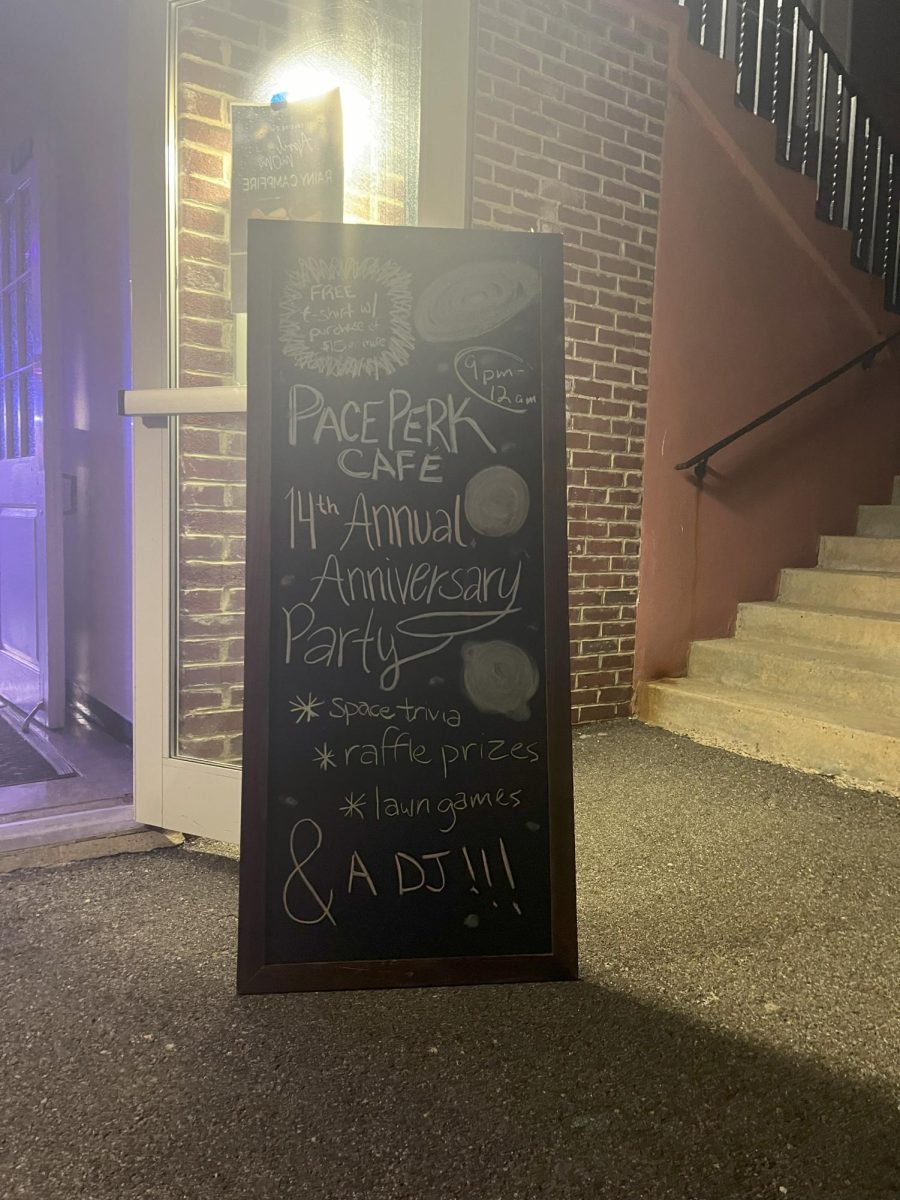At any family gathering, if you want to ruin the evening, mention politics and let the chaos ensue. Pace’s Greek Life has a similar phenomenon if you mention the organization Gamma Sigma Sigma.
Gamma Sigma Sigma (ΓΣΣ) is a national service sorority open to men and women that was brought to Pace’s Pleasantville campus in Nov. of last year and has been the center of controversy ever since.
“Gamma Sigma Sigma has personally attacked UPC organizations, stolen exact recruitment events from UPC organizations, called themselves the ‘other sorority outside of UPC’ to potentials during the Club Fair, denied entrance into the community service organization simply because the potentials are already members of UPC organizations, and have yet to recruit one male member,” said senior psychology major Melissa Badia, a member of Delta Phi Epsilon.
To understand the controversy of the organization, a basic understanding Pace’s Greek life is necessary.
Pace’s Greek Life is segmented into four self-governing councils. These councils are made up of various Greek Life organizations. For example, one of these councils is National Panhellenic Council (known as University Panhellenic Council or UPC at Pace), which consists of social sororities on campus (Delta Phi Epsilon, Phi Sigma Sigma, etc.). If UPC decides to expand the number of organizations they have on campus, it is voted on at a local level by the council and approved on a national level by UPC’s headquarters. Similar methods of expansion are present in the other three councils as well.
ΓΣΣ differs from other sororities on campus because it is a Service sorority as opposed to a Social sorority. It does not belong to a council and was brought to campus outside of the Greek councils.
In Nov. 2011, members of Gamma Sigma Sigma’s interest group presented to Student Association to get approved as an organization on campus. A vote was taken and the organization was denied due to voting members being concerned with the usage of Greek letters for a non-social sorority and unwillingness to share funding with the organization.
“They kind of took it as another sorority that wanted to come to campus, but that’s not what it is,” said senior childhood education major Jessica Lolis, the current Membership Vice President of ΓΣΣ.
At the time, many organizations were being denied through Student Association, a trend that troubled Rachel Carpenter, Director of Student Development and Campus Activities (SDCA).
“These women were denied an opportunity to make an organization that I believed was solely about community service,” said Carpenter.
In response to the various organizations being denied, Carpenter reached out to ΓΣΣ and suggested they get approved through SDCA instead. The organization wouldn’t be able to received funding but they would be recognized as a group that was on campus. The approval of SDCA allowed ΓΣΣ to exist but doomed them to constant confusion from the Greek community.
“We were told that they weren’t a Greek organization but a club,” said junior psychology major and member of Alpha Lambda Sigma Angeline Ochere.
The differences between being Greek and being in a club might not matter to the average onlooker but it’s an essential difference for members of Greek organizations. Greek organizations have various rituals and traditions that are considered sacred.
For example: being initiated into a Greek organization requires going through an education period followed by an initiation ceremony at the end of a multi-month-long process. Joining a club does not require education or an initiation ceremony. However, ΓΣΣ was initiating their members and requiring an education process in order to join.
“We have to follow our national,” said senior biology major Cherelle Palmer, the president of ΓΣΣ. “Nothing that we’ve done was created on our own.”
ΓΣΣ is a national organization with national rituals and ceremonies even if locally they are considered a club. However, these rituals are allowed for any organization on campus. ΓΣΣ is allowed to have education, initiation and bigs/littles because all organizations are, including clubs such as Black Student Union, Philosophy Club or The Pace Chronicle.
However, the similarities between ΓΣΣ’s method of operating is much closer to a UPC organization than anything else. In one particular instance, ΓΣΣ hosted a recruitment event called “ΓΣΣ Under the Sea.” Delta Phi Epsilon, a social sorority under UPC, has run an identical event called “ΔΦΕ Under the Sea” for several years. The similarities were obvious.
Administration at Pace believes the minor disputes point to a bigger issue.
“There is a disparity in Gamma Sigma Sigma in what they claim they say they do and what they’re doing on campus,” said Robert-Thomas Jones, Assistant Director for Greek Life. “I think if they did live out their purpose here, I don’t think there would be as much resentment to their group.”
The claim is that ΓΣΣ’s goal is community service. Members are required to complete a minimum amount of community service hours per semester. Last semester, members were required to fulfill twenty hours of community service. Most Greeks have not seen ΓΣΣ’s community service, but the organization claims that they went far past their minimum.
Last semester ΓΣΣ completed 969 hours of community service and all but one of the thirty-one members completed their community service hours. The average amount of hours per member was 28. The majority of their community service events were off-campus. Some events included: a senior prom at a nursing home in Briarcliff, volunteering at a children’s hospital in Valhalla and working with Successful Learning Center to integrate adult students at Pace with the community.
ΓΣΣ is aware that their community service has flown under the radar and has made an effort for more of their service events to be opened to Pace students. For example, ΓΣΣ will be working with Students Veterans Association throughout Nov. on a few open events. In total, they intend to have eight events opened to the Pace community.
Palmer is also aware of the negative allegations against ΓΣΣ of selective membership and attacking UPC. She insists they are not true.
“We have never denied membership to anyone or attacked any organization on campus, Greek or not. We are always striving to better our reputation on campus by reaching out to organizations for co-sponsorship on events. We do not ever respond to the negative comments that are brought our way. Instead, we let our actions and commitment to community service do the talking,” said Palmer.
Some members of UPC organizations are still at odds with ΓΣΣ.
“What bothers me the most about Gamma Sigma Sigma is that they want to turn everything on UPC when in reality they have started the issues,” said Badia.
Many members of UPC organizations are in agreement with Badia’s claim, while others think the situation is a misunderstanding.
“I believe if all this would have been explained at the beginning the Greek community wouldn’t have reacted the way we did. We are a very open minded group of people. I do not have a problem with Gamma Sigma Sigma or anyone in it,” said Ochere.
As of now, UPC and ΓΣΣ plan to meet in the near-future to discuss the concerns each organization has. There isn’t a set date, but each side hopes to resolve the tension and continue with their objectives.
“I really think they can both come to an understanding for why each other exist and what the differences are,” said Carpenter. “I don’t know if there is a compromise, I think it will be an understanding.”



